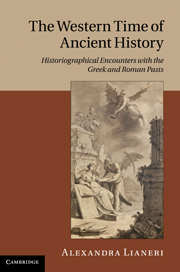Book contents
- Frontmatter
- Contents
- Acknowledgements
- Notes on contributors
- INTRODUCTION
- THEORISING WESTERN TIME: CONCEPTS AND MODELS
- ANCIENT HISTORY AND MODERN TEMPORALITIES
- 5 The making of a bourgeois antiquity: Wilhelm von Humboldt and Greek history
- 6 Modern histories of ancient Greece: Genealogies, contexts and eighteenth-century narrative historiography
- 7 Acquiring (a) historicity: Greek history, temporalities and Eurocentrism in the Sattelzeit (1750–1850)
- 8 Herodotus and Thucydides in the view of nineteenth-century German historians
- 9 Monumentality and the meaning of the past in ancient and modern historiography
- UNFOUNDING TIME IN AND THROUGH ANCIENT HISTORICAL THOUGHT
- AFTERWORD
- Bibliography
- Index
7 - Acquiring (a) historicity: Greek history, temporalities and Eurocentrism in the Sattelzeit (1750–1850)
from ANCIENT HISTORY AND MODERN TEMPORALITIES
Published online by Cambridge University Press: 03 May 2011
- Frontmatter
- Contents
- Acknowledgements
- Notes on contributors
- INTRODUCTION
- THEORISING WESTERN TIME: CONCEPTS AND MODELS
- ANCIENT HISTORY AND MODERN TEMPORALITIES
- 5 The making of a bourgeois antiquity: Wilhelm von Humboldt and Greek history
- 6 Modern histories of ancient Greece: Genealogies, contexts and eighteenth-century narrative historiography
- 7 Acquiring (a) historicity: Greek history, temporalities and Eurocentrism in the Sattelzeit (1750–1850)
- 8 Herodotus and Thucydides in the view of nineteenth-century German historians
- 9 Monumentality and the meaning of the past in ancient and modern historiography
- UNFOUNDING TIME IN AND THROUGH ANCIENT HISTORICAL THOUGHT
- AFTERWORD
- Bibliography
- Index
Summary
The aim of this chapter is to look at the interconnection between the emergence of Greek history as an independent field, the construction of new temporalities and the discourse of Eurocentrism during what Reinhart Koselleck and the Begriffsgeschichte school have come to call the Sattelzeit.
I would like to begin with two methodological reflections which, in my view, will be important for any further work on the subject. My first point is that the history of historiography cannot be simply another form of intellectual history. Most students of historiography study past historians, in order to elucidate the intellectual history of previous societies; they have studied how political, philosophical or cultural discourses or class concerns have manifested themselves in the study of history and how the study of history has contributed to these wider discourses. This is certainly legitimate; but in a sense, it is only one part of the story. For there is a crucial difference between studying the intellectual world of Michelet and that of Hegel or Hugo; between that of Herodotus and that of Plato or Sophocles. And the difference is precisely that Herodotus or Michelet are historians, colleagues.
When we study how they came to write history, how they constructed their historical subject or framed their historical narrative, this has implications for the way we as historians in the here and now pursue similar aims.
- Type
- Chapter
- Information
- The Western Time of Ancient HistoryHistoriographical Encounters with the Greek and Roman Pasts, pp. 156 - 178Publisher: Cambridge University PressPrint publication year: 2011
- 2
- Cited by



